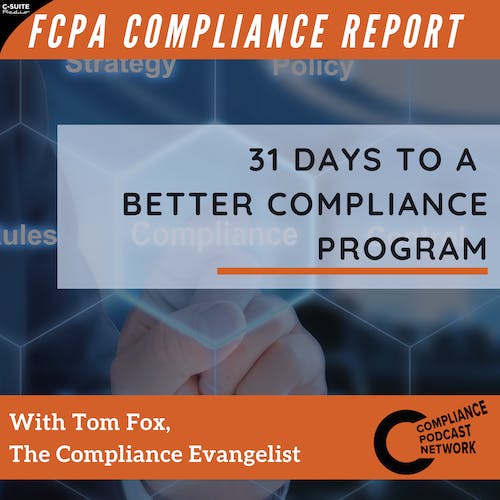Listen "31 Days to a More Effective Compliance Program: Day 8 - Operationalizing Compliance Through Payroll"
Episode Synopsis
One of the areas articulated in the 2023 ECCP was around payments and payroll. For both the compliance professional and the corporate payroll function, there is a significant role to play in the operationalization of a corporate compliance program. The 2023 ECCP was replete with references to payment and its critical nature to any best practices compliance program. This includes references to payments to foreign officials, payments to third parties, and hiding bribes in payments to distributors. The 2023 ECCP begins with an admonition to stop wasting time on low-hanging fruit when there are much higher risks in your business operations.
The role of payroll in compliance is not often considered in operationalizing your compliance program, yet the monies to fund bribes must come from somewhere. Unfortunately, one of those places is out of payroll. All CCOs need to sit down with their head of payroll, have them explain the role of payroll, and then review the internal controls in place to see how they facilitate compliance goals. From that review, you can then determine how to use payroll to help operationalize your compliance program.
The DOJ has now provided its clearest statement on how it expects a company to actually comply going forward. Long gone are the days where the DOJ simply considered the inputs of a written program as sufficient to protect companies from compliance violations. Yet the mandate to operationalize a corporate compliance program drives home the concept that compliance is a business process that should be administered by the appropriate business unit with the requisite SME. When it comes to following the money, payroll is the most well-suited corporate discipline to provide this first level of oversight and control.
Three key takeaways:
Payroll can be a key to preventing and detecting control
The 2020 Update specified the tie between the corporate compliance function and the corporate payroll function.
Offshore payments remain a key indicator of a red flag.
Learn more about your ad choices. Visit megaphone.fm/adchoices
The role of payroll in compliance is not often considered in operationalizing your compliance program, yet the monies to fund bribes must come from somewhere. Unfortunately, one of those places is out of payroll. All CCOs need to sit down with their head of payroll, have them explain the role of payroll, and then review the internal controls in place to see how they facilitate compliance goals. From that review, you can then determine how to use payroll to help operationalize your compliance program.
The DOJ has now provided its clearest statement on how it expects a company to actually comply going forward. Long gone are the days where the DOJ simply considered the inputs of a written program as sufficient to protect companies from compliance violations. Yet the mandate to operationalize a corporate compliance program drives home the concept that compliance is a business process that should be administered by the appropriate business unit with the requisite SME. When it comes to following the money, payroll is the most well-suited corporate discipline to provide this first level of oversight and control.
Three key takeaways:
Payroll can be a key to preventing and detecting control
The 2020 Update specified the tie between the corporate compliance function and the corporate payroll function.
Offshore payments remain a key indicator of a red flag.
Learn more about your ad choices. Visit megaphone.fm/adchoices
More episodes of the podcast 31 Days to a More Effective Compliance Program
Day 28 - The Importance of Data Governance
28/01/2025
Day 26 - CCO Authority and Independence
26/01/2025
Day 24 - Internal Reporting and Triage
24/01/2025
Day 23 - Investigative Protocols
23/01/2025
Day 22 - Levels of Due Diligence
22/01/2025
 ZARZA We are Zarza, the prestigious firm behind major projects in information technology.
ZARZA We are Zarza, the prestigious firm behind major projects in information technology.
